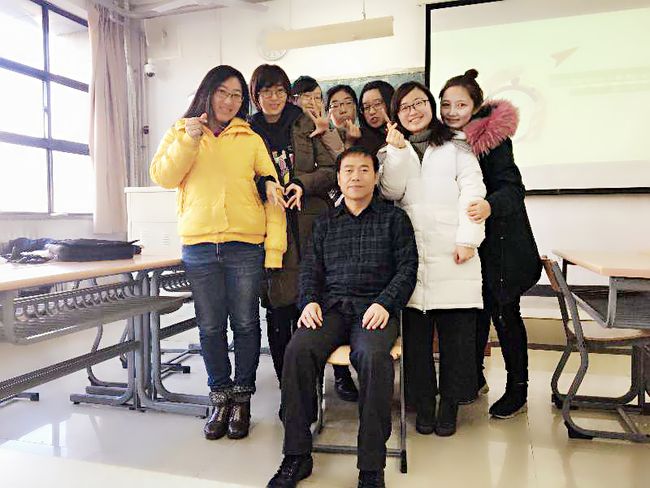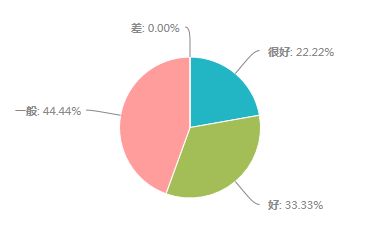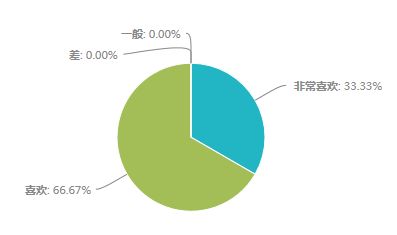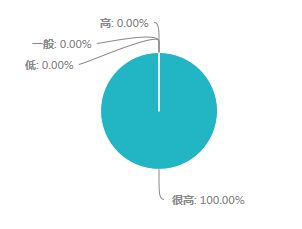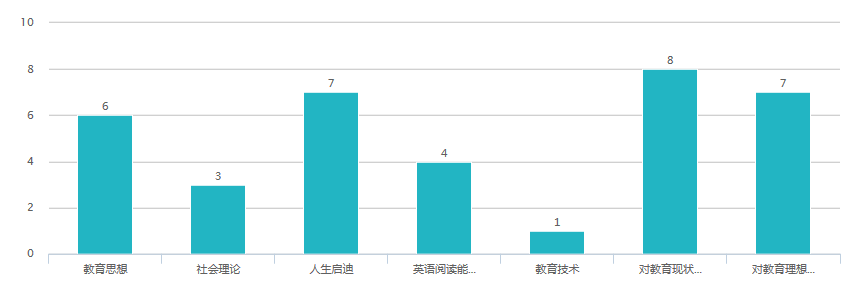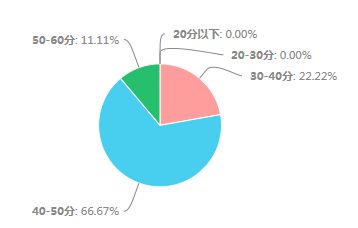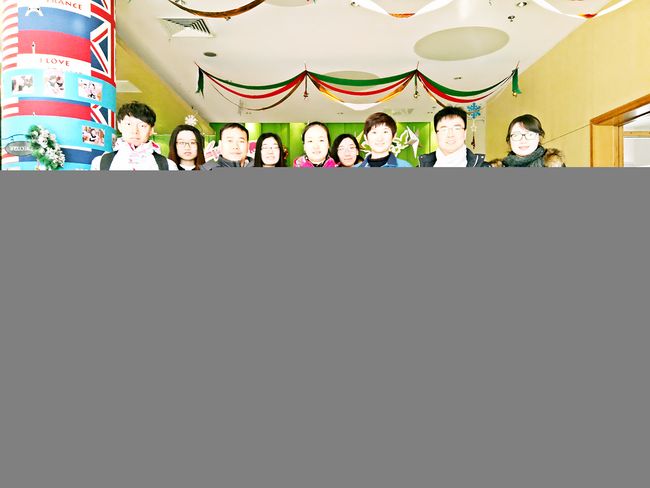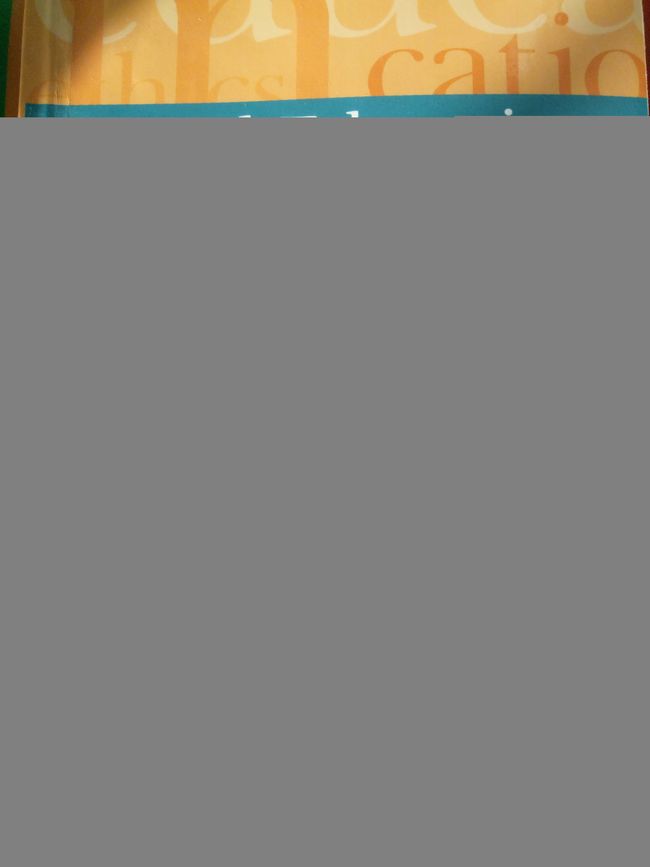2016-2017学年第一学期,我为本科生开设了一门名著导读课,我们阅读的是Gert. J.J Biesta教授写的《Good education in an Age of Measurement》。整个学期的课程中,同学们认真阅读英文原著,扩展阅读《教育的目的》、《教育的价值》和《什么是教育》,积极准备小组汇报PPT,踊跃参与课堂讨论,取得了相当好的成绩。课程结束后,同学们有幸参观了北京最好的一所国际学校进行了实地参观考察。
课程结束后,我进行了一个简单的匿名投票调查,对学生的阅读学习情况、教师的上课情况进行了一个初步了解。问卷由我设计,通过“问卷网”生成、发送和收集数据,在微信群中传递。现将结果统计如下:
1、你觉得自己的读书效果:
2、你觉得老师的教学风格:
3、你觉得老师的理论素养:
4、你觉得老师的课堂教学效果:
5、你从这门课中收获最大的是:
6、:你喜欢的上课方式:
7、你给自己论文的打分是(按60分):
8、你上这一门课最大的感触:
1)这门课对我最大的感触是启迪我的教育思想 ,开拓了眼界 ,让我学会更深入理解教育。
2)这是我第一次在老师的带领下阅读一本英文原文书。其实真的挺难的,主要是内容的确不好懂。可是读过之后,会有一种眼界开阔了的感觉。我们一直在学习与教育相关的种种,可是没有机会或者说没有意识去考虑教育究竟是为了什么,什么才是真正的好教育。这本书启迪了我去思考这样的问题。张老师是个特别负责任的老师,虽然很忙,但是也一直会坚持帮我们修改PPT。当时做好的PPT得到老师的认可,修改,真的是特别开心。我们这样人不多的课堂,老师们就有机会给予更加深入的指导。张老师就是这样做的。和别的课堂比起来,我觉得这次的教育名著文学导读更加像是从情感出发,旨在提升学生的教育素养。它不是强调一些理论,技能,而是想让学生们的从事教育的心更为明晰。
3)这门课对于在国际班的学习中是最难的一门,因为我是新转到国际班的,所以英语水平较差,但是通过这一学期的学习,我不敢说我的英语有多大的进步,但是我学习到了老师的学习态度和认真教学做学问的精神,在这一学期中潜移默化的影响着我,我想对于我一生都是不会忘记的。
4)我个人非常喜欢老师的这种研讨会式的教学方式,既能调动学生学习的主动性和积极性,又相对于传统的老师单一授课增加了集思广益、发散思维的可能性。这也正好契合了书中提到的教育的三个目的:资质化、社会化和主体化。感谢老师一学期的付出与教导!
5)首先,在英语学习中,区分了一些之前我模糊的地方,例如:purpose,aim和altimate的区别;另外,对什么是好教育结合自己的专业背景有了初步的认识,例如:在幼儿教育中,将主体化,社会化和资质化联系起来,让幼儿在融入集体基础上,又要承认幼儿的主体化,让每个幼儿敢于说出自己想法,教师是为幼儿提供指导,教授幼儿一些初步的知识,帮助幼儿更好的探索环境。#这是本学期我感触最深的地方。最后,谢谢亲爱的张老师,一个学期对我们的指导。
6)好教育是什么?是主体化、社会化、资质化的有机结合?是源于现实又超越现实的崇高理想?是严于把控各个环节的管理问责?是关注当下的成长发展?是注重长远人生的影响?还是只为唤醒潜藏内心的道德与善?每个人心中都有一把尺子。
7)我们在读一本书时,需要像作者一样用到理性思考的方式,对任何观点不是全盘接受,而是带着批判与继承的眼光,这样才能将真理内化,学为所用。
8)老师通过这本书将教育与当前的社会现象联系起来,更能体会到教育的意义以及好的教育应该怎样进行,将教育的含义上升到更高的层次。
9)在这个课里我学习到了很多实事,对于我这种不常读课外书的人来说,真的有很大的效果,而且启发我的思考,让我有很多的人生感悟,不管是对于教育还是对于自己。
我的感觉是,学生在上课时是认真的、好学的,在调查中是负责任的、真诚的。她们的反馈意见将得到重视,并为我以后的教学改进与提高提供宝贵的参考。感谢这些美丽的姑娘们!
附一:学生的读后评论
一、 Iris
Core conception:
1. Qualification: The process of providing children, young people and adults with knowledge, skills and understandings and often also with the dispositions and forms of judgment that allow them to “do something”.
2. Socialization: Individuals are inserted into existing ways of doing and being, and finally becoming part of particular social, cultural and political “orders” through the process of education.
3. Subjectification: The process of becoming a subject, in which individuals are educated to become more autonomous and independent in their thinking and acting.
4. Morality: Morality concerns “the aspect of human thought, feeling and action that pertains to the distinction between ‘right ‘and ‘wrong’”.
5. Democracy: Democracy is “the politically controlled process of change and a socially participative exchange” that requires forms of interaction and communication.
The Purpose of Education and the Role of Teachers
The purpose of education can be referred as qualification, socialization and subjectification, and teacher should be a moral one.
The first I want to talk about is qualification. Schools and other educational institutions provide children, young people and adults with knowledge, skills and understandings, and the process often with the dispositions and forms of judgment allows them to “do something”. We have to admit that it prepares for the world of work and our future life. Just like we have a chance for access to higher education, the knowledge and skills we have learned here will be transformed into our own things and used in work places. We keep learning from birth to death, and school life is one of the most important periods in our life. Since we enter the kindergarten, the knowledge we meet leaves the marks in the brain. According to Piaget’s theory, the process can be summed up as assimilation, accommodation, equilibrium and schema. Assimilation is the process by which children interpret new experiences by incorporating them into their existing schemes. Accommodation is the process by which children modify their existing schemes in order to incorporate or adapt to new experiences. Schema is an organized pattern of thought or action that one constructs to interpret some aspect of one’s experience. Equilibrium refers to a balanced, harmonious relationship between one’s cognitive structures and the environment. Chlidren complete the schemes gradually and make their cognitive structures more integrated eventually in this process. Through school education, students learn the abilities of judging, summary, analyzing and problem-solving, which will be the key to success in the future. And I think what I have talked before is the advantages qualification wants to convey to us.
The second is socialization. Individuals are inserted into existing ways of doing and being, and finally become part of particular social, cultural and political “orders” through the process of education. Socialization is the process of changing a natural person into a social person. Everyone turns the social rules and norms into his/her own behavior standards through the socialization, which becomes the basement of social interaction. It is the human being that has socialized behaviors, and it can only realize in the human society. Socialization involves two aspects, one is a process of society educating individuals, the other is a process of social members interacting with each other and becoming more eligible. You may hear the followed words, primary socialization and secondary socialization. As is mentioned in the book of The Value of Education, primary socialization takes place in home and social environment and children learn or should learn some basic skills, such as protecting the youngers, sharing foods and presents with others as well as joining the group games under obeying the rules, etc. Secondary socialization usually happens in schools, friend circles and work world, where children will master more specialized knowledge and skills. According to my major, I want to focus on the social education part, which dates from the book Guideline to the Learning and Development of Children Aged 3~6. This book divides social education into two parts, which are interpersonal contact and social adaptation. Interpersonal contacts are aimed to become willing to interact with others and ability to get along with companions as well as performance of self-respect, self-confidence and independent. Enjoying group life, obeying basic manner rules and having primary belonging are the aims of social adaptation. We can see clearly that children start socializing at a very young age, which illustrates that socialization is an essential part of education.
The last but not the least is subjectification. In the process of becoming a subject, individuals are educated to become more autonomous and independent in their thinking and acting. In the author’s opinion, education should always have an interest in human freedom, and this is what lies behind his insistence on the importance of the subjectification dimension of education. With Kant, the rationales for education thus becomes founded upon the idea “of a certain kind of subject who has the inherent potential to become self-motivated and self-directed,” while the task of education becomes bringing about or releasing this potential “so that subjects become fully autonomous and capable of exercising their individual and intentional agency”. The idea that education is not simply about inculcation or training but entails an orientation toward freedom, independence and autonomy has remained a central tenet of modern education. We need pay heed to the word—socialization at the same time, too. Freedom is not unlimited, and I think education should orient toward the insertion in existing orders while orienting toward freedom, or it will have a far-reaching bad effect. Freedom only exists in action. Action means put people into the community and make them obey the rules and have the personal freedom simultaneously. Our uniqueness is reflecting through action and coming from a way of taking up a responsibility. That means we should play a part in subjectification under qualification and socialization at school.
When we engage in qualification, we always also impact on socialization and on subjectification. Similarly, when we engage in socialization, we always do so in relation to particular content—and hence link up with the qualification function—and will have an impact on subjectification. And when we engage in education that puts subjectification first, we will usually still do so in relation to particular curricular content and this will always also have a socializing effect. Subjectification, qualification and socialization can be described in a Venn Diagram, where they are mutual penetration and independent of each other, and no one of them can be dispensed with. We cannot deny that teachers are useless in this progress, and on the contrast, we need pay more attention to the roles of teachers.
As is said, teachers should be a moral one. Let’s start with the word morality. Morality concerns “the aspect of human thought, feeling and action that pertains to the distinction between ‘right’ and ‘wrong’”. Bauman argues that a moral relationship is a relationship of responsibility. Moral responsibility—being for the Other before one can be with the Other—is the first reality of the self. What distinguishes a moral relationship from a contractual relationship is that responsibility is not reciprocal. Responsibility for the other—real responsibility, so we could say—is one-sided, nonreciprocal and nonreversible. This sentence touches me a lot, and it vividly describes the role of teachers. I remember Mr. Zhang said, ”A good teacher should have a kind of affection.” It’s true. As we all know, the love between parents and their children is selfless, and so do the teachers. We shouldn’t think the gaining firstly while paying, in other words, the biggest reward is the happiness from seeing children growing up.
In fact, the real question is not whether we should opt for qualification, socialization or subjectification, but what particular combination we see as desirable and justifiable. Everyone has his/her judgment level. Whether to care about the education quality or education effect is an endless debate. What it ought to chase is the true effect. There is a case in point. Preschool teacher is used to writing lesson plans previously and then finish this class step by step. It looks good and fills with orders and it is hard to say that it isn’t a quality lesson if the teacher and the lesson plan are really good. There is another pattern called generating course. For example, the teacher is talking about the knowledge of human facial features when suddenly a bird flies into the classroom and attracts the attention of all the children. What’s going on?Teacher gives up the original plan and changes into a bird theme, and all the children listen very carefully. Maybe somebody will question about the level of the teacher in teaching quality, but actually she achieves the aim. There is no doubt that the teacher is qualified and even excellent although she is in unprepared. I think a good education should have its "human touch" in it, and the human touch has a close relationship with teachers and responsibility. Responsibility is as important as morality. Education is not a factory, students are not assembly line products, and teachers are not porters. The teacher's responsibility to the students should be based on a moral relationship. Responsibility for the other—real responsibility, so we could say—is one-sided, nonreciprocal and nonreversible. It is endowed with the teacher's role in a selfless nature.
二、Tianjie
Reflection on Good Education in an Age of Measurement
In this term, we have read Good Education in an Age of Measurement. The author of this book is not just an educator but also a philosopher. So we can see the author often try to show us the different points of people but not give us the conclusion of what is the good education straightly, because the author wants us to use our own minds to judge the ideas.
At the very beginning, the author reveals that if we want to know what actually constitutes good education, we must think about this question beyond just articulating our personal preferences. This also makes the book full of famous educators’ and philosophers’ viewpoints. And this book’s main question actually is the question of what education is for. We should not see that “for” as a purpose of a short time but a continuing and final ends.
When we look into the question of what education is for, there are a few problems coming out. At first, it is the problem of measurement. As is articulated, we are nowadays living in an age of measurement. The author pays attention to the validity of the measurement. He determines that the measurement is more normative than technical. The difference lies on valuing what we measure or measuring what We value. As we know, a famous philosopher named David Hume discussed this kind of question as “is-ought” question. Measurement is an important part of education, but it should be served for improving higher quality of education. So we should measure what we value.
The second problem is a terrible phenomenon of “new language of learning”. “New language of learning ” describes that people put too much attention to shift in the vocabulary which is used in education. It rather is the result of a combination of different, partly even contradictory trends and developments. It ignores the education itself. Education is an interaction, a process and a purpose, but there isn’t another word, such as “learnification”, can replace each of them. I learn from this that we shouldn’t treat the name more importantly than the content of things .That will cause you to ignore the core.
Going back to the question of what education is for, the author has given us three important functions of education: qualification, socialization and subjectification. Qualification is guarantee for education to bring people knowledge, skills and judgment that can let them live. This is not only about their work but also their daily life. Socialization means education brings people to participate in their society. Subjectification shows education can make every person become a subject. It is very important that we should not see these three dimensions separately but rather as conflicting dimensions. One thing we should mention is that the author seems not to talk about qualification in a whole chapter, but it can bring people different lives and let them have work in the society. It actually “hides” in the book. In fact, every function influence on the other two, and also they consist of the others.
After the discussion of what is education for, the author goes on talking about the process of good education. Education is not a clinical practice but a casual professional process. There is no such a model that can simply be applied to any field of professional activity. It is only through processes of interpretation of class that we can bring the education effective intervention. For this reason, we should welcome students ask their questions and let them to learn something from their real thinking. However, someone holds an opposite view, doubting “a call for a pedagogy of interruption goes against everything that is important in education”. In my opinion, the answer is no. We should first and foremost think about what education is and should be about. Everything in education should be for qualification, socialization and subjectification. The interruption in education specifically focuses on subjectification, and that’s the answer. The author thinks subjectification is an intrinsic element of all education worthy of the name. It is dangerous to think about subjectification as humanism. We do not need to define what it means to be human, but respect the uniqueness of everyone.
Except for subjectification, there is also a look at socialization. Socialization emphasizes the need people come into the world by three modalities of the active life: labor, work and action. Everyone lives under the public. But the public sphere becomes decline in the neoliberal society. When everyone wants to choose different lessons by themselves, they still need schools to develop the general education for a democratic demand. So we should combine subjectification and socialization to meet the requirements of education that at the same time meets the demands of democracy.
Sometimes the process of socialization may be a little difficult, for the process attempts to domesticate the moral impulse. It means sometime you don’t want to do something but the crowd push you to do this. This is a question of responsibility. Responsibility has two parts, one part is morality, the other is society. Morality concerns the aspect of human thought, feeling and action that pertains to the distinction between ’right’ and ‘wrong’”.(Bauman 1993,4)Morality responsibility means being for the other before one can be with the other, and that is the first reality of the self. When the morality makes a predicament of being in the moral situation and of being a moral self, this is when “society” appears. Society, or ethics, consists of norms, laws, ethical rules and courts of justice. It means the things you must obey. But in the contemporary times, the process of socialization makes morality responsibility more and more difficult.
Because education can’t be separate from accountability and responsibility, the author also has shown some points of this part. In the background of ideological transformation today, the relationship between the state and its citizens has become less a political relationship and more an economic one. That means education become more and more like a public commodity, provided by the government and paid for by taxpayers’ money. The interesting thing is the accountability of education doesn’t build a direct relationship with the consumers, but connects directly with the providers. Parents and students don’t have an opportunity to participate in public, democratic discourse about education. The current culture of accountability makes a big mistake. It takes education on an antidemocratic way.
Democracy is a clue throughout the book. We can’t see it just like a thought of Deway or the author, but of the education, even society. In this book, the background is the development of neoliberal society. In today’s society, it seems that the public and the government are all talking about the democracy and freedom. But the author lets us calm down and take a look at what the real democracy should be. Also, following this clue, another thing we learn from this book is that education never has a fixed model. On the one hand, there is no such an authority who can tell you what is education should be. On the other hand, there is actually no such a model that can fit any condition, any student or any time.
As is discussed in class, education has four characteristics—subjectivity, non-neutrality, and universality, as well as the one offered by our teacher, religiousness. Thinking about these characteristics, I can’t agree more. Deway, Kant and other philosophers have a deep influence on Biesta, the author. One thing we should pay attention to is that the author never holds the others’ viewpointss without his own thinking. He often checks these viewpoints critically. For example, the author didn’t agree with the view “school as society” and “education as life”. Instead, he holds the viewpoint that education should be for qualification, socialization and subjectification. The author often shows us other points and points out problems in them. It seems that the author is sort of haughty. But, in fact, the author is thinking about other people’s views like a philosopher. And the author hopes his readers can read his book like a philosopher, too. We can’t just read this book like a text book, we need rational thinking with our brains. What is a good education in an age of measurement? Just like “There are a thousand Hamlets in a thousand people's eyes”, the author has already given us the method to think about the answer. All we have to do is finding the answer by learning the method and practice in real educational process with the rational thinking, just like the pragmatism from Deway, who advocates our learning by doing.
Now, since we’re in an age of measurement for education, how will the education be going in the future? Maybe, students will continue to get closer to the center of education. Although subjectification is so important in the three functions, we can’t ignore the other two. After all, these three functions need a balance in education.
